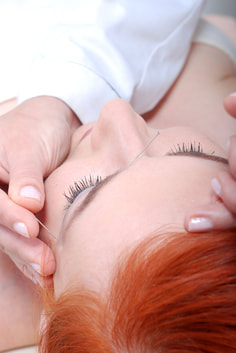 A study published in the Journal of Acupuncture and Meridian Studies looked at the efficacy of acupuncture to control the symptoms of primary dysmenorrhea. The study examined 60 women who were split into two different groups: the study group or the control group. The women in the study group received acupuncture for 15 days per month over a 90-day period. The women in the control group did not receive acupuncture. At the end of the study, it was concluded the women receiving acupuncture experienced far fewer symptoms with less severity than those who did not receive acupuncture. Symptoms such as cramps, pain, mood changes, diarrhea and fatigue all were reported less frequently in the study group. This study indicates that acupuncture is a viable tool for treating dysmenorrhea. Dysmenorrhea, also known as painful menstruation, is the most commonly reported gynecological problem in women who are menstruating. Dysmenorrhea is a subgroup of pelvic pain that can manifest as painful menstrual flow. The cause of dysmenorrhea is not specifically known by conventional medicine, but it has been determined that women suffering from this pain have increased levels of the hormones prostaglandin, oxytocin and vasopressin. These three hormones stimulate pain fibers in the uterus, leading to increased overall pain that can last for several hours or days. To help determine if a woman is truly suffering from dysmenorrhea, a monthly journal is usually kept to note any similarities from one period to the next. Typically, dysmenorrhea is diagnosed through the use of a pelvic exam, blood and urine tests and possibly a pelvic ultrasound or x-rays. Conventional medicine treats dysmenorrhea with non-steroidal anti-inflammatory medications and hormonal supplements, like oral contraceptives. But these are not without their side effects. Eastern Medicine, however, considers the whole person when diagnosing and treating. Traditional Chinese Medicine (TCM) looks at the patient holistically, considering all aspects, including the mind, the body and the environment of the person. Diagnosis of a person includes inspection and observance of the expressions, colors, appearance, smells and any idiosyncrasies that may be present. TCM also looks at the patient’s tongue and pulses on both wrists. These two practices are the primary diagnostic tools used in TCM. The tongue and pulses can reveal quite a bit of information about what is going on internally. Different areas of the tongue correspond to body systems and energetic pathways. For example, the tip of the tongue can show irregularities related to the heart and the mind. The rear of the tongue can show irregularities related to the urinary bladder and kidneys and is associated with the emotion of fear. The pulse is also broken down into six locations, three on each side, all of which correspond to a body system and the related energetic pathway. With dysmenorrhea, the liver energetic pathway is the most commonly involved. When the liver pathway is involved, it is most commonly due to emotional issues, rather than physical problems. However, over time, emotional issues such as anger, irritability and frustration can lead to physical problems in the body, including breast tenderness, large blood clots during menstruation, headaches and high blood pressure. Acupuncture is one of the tools used by TCM practitioners to help bring balance back to the body. Studies have shown that women who receive regular acupuncture tend to have fewer symptoms of dysmenorrhea or their symptoms are less severe over time. This is because acupuncture helps decrease pain and inflammation, while also calming the mind and digestive tract. Many women who receive regular acupuncture treatments also take power naps while the needles are in place, which can help with the symptoms of dysmenorrhea. To treat dysmenorrhea, a licensed acupuncturist may use several tools, including acupuncture, herbs, nutrition and possibly even mind body practices like meditation. It all depends upon the severity of the condition. To find out more, contact a practitioner in your area. https://www.sciencedirect.com/science/article/pii/S2005290117302066 Source: http://bit.ly/research5119 |
AuthorsRebecca M H Kitzerow is a Licensed Acupuncturist practicing in La Center, Washington. With over a decade of experience she has won 10 Nattie consumer choice awards from Natural Awakenings Magazine since 2014. Archives
July 2024
Categories
All
|
Photos from Hey Paul Studios, BeGreen_Studio, Pawel Pacholec, 1950sUnlimited, toulupaliaqaz, Joelk75, OnTask, Robert Gourley, cnu_sports, Mitya Ku, wuestenigel (CC BY 2.0), FootMassagez, 401(K) 2013, Mariana Heinz, @EdwardTerry, fishhawk, liverpoolhls, torbakhopper, Boemski, dolomitibl, Driscolltheque, Dave n Laura, Vaping360, MVWorks, Life Mental Health, MVWorks, mikefats, Scot Nelson, jfl1066, wZa HK, ruurmo, Guadalupe Cervilla, Army Medicine, GViciano, torbakhopper, adrigu, Saulo Cruz, Ben Cumming, marniejoyce, kcxd, JasonCorey, kanenas.net, Live to Create Photography, gm.esthermax, Unique Hotels Group, Zenspa1, mysiana, Tobias Lindman, Leader Nancy Pelosi, Kristoffer Trolle, swanksalot, Bill Selak, Parker Knight, stimpsonjake, Gedankensprudler, SuperFantastic, tonynetone, marniejoyce, JeepersMedia, Illusive Photography, 'Ajnagraphy', Iban Torras, scotted400, gtall1, dvanzuijlekom, BPPrice, Skley, torbakhopper, Renato Ganoza, anka.albrecht, QUOI Media, Public Domain Photos, Instant Vantage, Victor Tongdee, Free Grunge Textures - www.freestock.ca, sportEX journals, Nadja Tatar, angela n., marniejoyce, MVWorks, Karolina Kabat, Thomas Fisher Rare Book Library, UofT, ginnerobot, tracilawson, haven't the slightest, My Photo Journeys, Pierre Willemin, Florena_Presse, SuperFantastic, colindunn, zzkt, TraumaAndDissociation, ER24 EMS (Pty) Ltd., shixart1985 (CC BY 2.0), marniejoyce, Tomás Fano, freestock.ca ♡ dare to share beauty, Archives New Zealand, Jaykhuang, airdrie.m, Go-tea 郭天, OnTask, wuestenigel, focusonmore.com, Disney | ABC Television Group, Andrew Gustar, Didriks, ConstructionDealMkting, charlywkarl, barnimages.com, Lel4nd, runwaypilates, michaelstephanfotografie, McLevn, TraumaAndDissociation, eLife - the journal, Lars Plougmann, wuestenigel, shixart1985, boviate, davis.steve32, kevin dooley, @the.photoguy (insta), frederic.gombert, Feathering the Nest, Victor Tondee, shixart1985, wuestenigel, Joe K Gage, kennethkonica
 RSS Feed
RSS Feed
